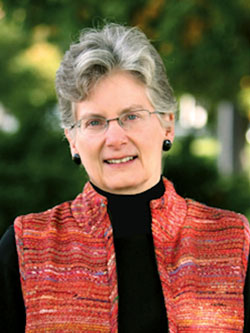 NOVEMBER 3, 2010
NOVEMBER 3, 2010
President Kristin Woolever
Several months ago I read an interview with Kristin Woolever, the new president of Prescott College here in Arizona. Prescott College is described as a private college that emphasizes liberal arts, the environment and social justice. Oh, oh.
Although Dr. Woolever has the kindly grandmotherly image of Andy Griffith's Aunt Bee, she is cooking up far more than apple pies. When asked where she would like to see Prescott College in ten years, she answered: "I hope Prescott College will be internationally recognized for its experiential approach to learning, have doubled its enrollment... and increased significantly the facilities and programs in the sciences, and serve as the epicenter for education in environmental studies and sustainability as understood through the lenses of the liberal arts and social justice." Yikes.

President Kristin Woolever
I have never heard the term "social justice" used that I don't hold more tightly onto my wallet, because most adherents have the goal of equal outcomes rather than equal opportunities in mind. And that's the kindest thing I can say about it.
I like economist Freidrich Hayek's justifiably low opinion of the whole idea: "Social justice does not belong to the category of error but to that of nonsense, like the term 'a moral stone'."
Don't even get me started on the mischief created by master planners when social justice is applied to the environment. This leads to the idea that a pigmy owl is equal to mankind in its claim on the forests where logging used to flourish or that a minnow's right to water trumps that of California farmers' right to grow crops.
Unbelievably, there are towns taken over by environmental extremists who believe a property owner doesn't actually own the trees or flowers he planted on his land since nature belongs to everyone. This sort of thinking led President Barack Obama's now famous illegal alien aunt Zeituni Onyango to lay claim to the welfare handouts of the U.S. all those years until a judge recently granted her asylum. She said the United States belongs to God, and that God gave her the subsidized housing and disability payments. Sort of warms your heart, doesn't it?
Then, there is that ubiquitous term: sustainability. Arizona State University President Michael Crow fell so in love with the concept that in 2007 he created the nation's first School of Sustainability at his Tempe campus. Heiress Julie A. Wrigley has given ASU's Global Institute of Sustainability at least $25 million. (Global-scale things cost money, you know.)
The trouble with applying the term sustainability to everything imaginable in order to pull money from the taxpayer is that it limits the time left for the more basic pillars of learning. Are you aware that some universities no longer require a course in economics in order to earn a masters degree in business administration? Some years ago I argued with the head of the nursing school at ASU about the silliness of replacing organic chemistry, the building block of medicine, with classes in awareness of cultural differences when interacting with patients! The mind boggles.
Quote of Note: "We have become a culture where making money doesn't entitle you to it, but wanting money does." – Former Ohio Secretary of State Ken Blackwell.

